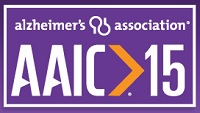Biogen ($BIIB) and Eli Lilly ($LLY), two drugmakers making big bets in Alzheimer's disease, are set to present clinical data on a pair of much-scrutinized projects with potential to change the industry's approach to the field.

Each is developing an antibody that targets beta amyloid proteins, buildups in the brain believed by many to contribute to Alzheimer's neurodegenerative effects. Such treatments have a long and dismal history in late-stage development--as can be said for most approaches to treating Alzheimer's--but some positive early data from Biogen's candidate have led to widespread optimism that the right combination of patients and treatment could finally spur Phase III success for amyloid blockers.
And at next week's Alzheimer's Association International Conference in Washington, DC, Lilly and Biogen will offer a peek at whether that new optimism is warranted.
On Wednesday, Biogen is slated to disclose more data from its aforementioned Phase Ib study on an antibody called aducanumab. In March, the company disclosed that the 3-mg and 10-mg doses of its treatment led to a statistically significant effect on cognition after 54 weeks, but Biogen needed more time to assemble data on patients who got 6 mg of aducanumab.
Now those results are ready for primetime. If the 6-mg dose performs proportionally as well as the others, Biogen will remain on track to start a Phase III trial later this year. But if the data look shaky, or if the 6-mg dose somehow fares worse than the 3-mg one, the recent goodwill surrounding amyloid could wane.
And on the same day, Lilly is scheduled to provide an update on solanezumab, a once-failed amyloid antibody that the company believes could find new life in a modified patient population. The treatment flunked two Phase III studies in 2012, failing to improve cognition and function compared to placebo. But, poring over the data, Lilly noted a positive effect on patients with mild forms of Alzheimer's, so the company extended the trials on those subjects for another two years, gathering the data to be presented Wednesday.
Positive results in the open-label extension study would bode well for Lilly's ongoing, placebo-controlled Phase III trial on mild patients, while more disappointment will further cloud solanezumab's future.
Beyond their importance to Lilly and Biogen, the two antibodies have become poster children for the amyloid hypothesis across the board. Aducanumab's early clinical success spurred a widespread reassessment of similar antibodies throughout the industry, with major players including Roche ($RHHBY) considering new bets on once-troubled treatments.